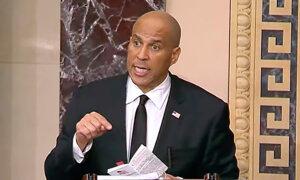The arduous 25 hour, 5 minute speech required days of physical preparation for the 55-year-old senator.
Late in the evening on April 1, Sen. Cory Booker (D-N.J.) yielded the Senate floor after a marathon speaking session that had begun more than 24 hours earlier, his speech shattering the record previously held by Sen. Strom Thurmond since 1957.
Rising at around 7 p.m. ET on March 31, Booker spoke through the night and into the next day, yielding the floor at 8:05 p.m., with his time on the floor clocking in at a total of 25 hours and 5 minutes. By that point, Booker, eyes wide and bloodshot, was visibly rocking back and forth on his tennis shoes, occasionally pacing around his desk.
As he broke the record at around 7:19 p.m., he received applause from both Senate and House Democrats in the chamber.
In his speech, Booker primarily targeted President Donald Trump’s use of executive authority, without challenging any singular piece of legislation.
The record-long speech served as a morale boost for Democrats, who, until now, have been reeling to articulate effective opposition after Trump’s sweeping 2024 win.
Thurmond’s record-breaking speech against the Civil Rights Act of 1957—a comparably weak precursor to the broader 1964 legislation—went for 24 hours and 18 minutes and came after weeks of preparation. It’s been unbroken until now.
Booker acknowledged this record in comments to reporters.
“I was very aware of Strom Thurmond’s record since I’ve gotten to the Senate,” he said. “It just seemed wrong to me. Always seemed wrong.”
Here’s how Booker made his way over the finish line to break one of the Senate’s most awkward records.
Rules of the ‘Standing Filibuster’
Once a Senate tradition best known for its representation in the classic 1939 film “Mr. Smith Goes to Washington,” the “standing filibuster” allows lawmakers to halt Senate business by continuing to speak without sitting or yielding.
Under the rules of the Senate, any senator is generally entitled to speak for as much time as they choose—a reflection of the equality between members observed in the upper chamber.
When a senator exercises this prerogative by retaining the floor, it’s known as a standing filibuster—which can only be ended by the votes of 60 members or by the speaker yielding.
In accordance with standing filibuster rules, Booker could not sit down or leave the chamber, even to use the restroom.
Technically, the standing filibuster requirement ended in 1975 in favor of the “silent filibuster,” which allows lawmakers to block any legislation that fails to win 60 votes initially.
Since then, a handful of lawmakers have delivered high-profile standing filibusters—most notably Sens. Bernie Sanders (I-Vt.), Rand Paul (R-Ky.), and Ted Cruz (R-Texas) in the 2010s—despite their not being required.
These filibusters have largely been symbolic, meant to bring attention to an issue or topic, or merely to delay the passage of legislation or confirmation of a nominee.
Physical Preparation
While the rules for maintaining a standing filibuster are relatively simple—don’t sit, don’t leave the chamber, and don’t yield the floor—preparing for such a marathon speaking session is far from it.
A bathroom emergency, dehydration, starvation, and simple physical collapse are physical risks that could end a speech early in the absence of proper preparation.

Strom Thurmond, U.S. senator from South Carolina, addresses the 1968 Republican National Convention, held at the Miami Beach Convention Center in Miami Beach, Fla., in August 1968. Graphic House/Hulton Archive/Getty Images
Booker, 55, has explained that he took similar steps, telling reporters that he stopped eating on Friday and ceased drinking on Sunday night.
“And so instead of fighting or figuring out how to go to the bathroom, I ended up, I think really, unfortunately, dehydrating myself.”
Early into the speech, Booker also ordered an aide to remove his seat in the chamber to reduce his urge to sit, Sen. Chris Murphy (D-Conn.) told reporters.
The Filibuster
Aside from the physical burden, filibusters of this length also require a great deal of prepared materials.
Even when a filibuster has a topic—such as preventing the passage of a piece of legislation or blocking an executive appointee—senators aren’t obligated to talk about related issues.
During his 1957 filibuster, Thurmond read from the Declaration of Independence, the U.S. Criminal Code, President George Washington’s farewell address, state laws, and other documents.
One of the most famous moments from any filibuster came in 2013, when Cruz used part of his 21-hour, 19-minute speech to read from Dr. Suess’s “Green Eggs and Ham.”
Due to parliamentary rules, a senator delivering a filibuster may yield for questions or comments from other members of the chamber without yielding the floor. Using this mechanism, other Democrat senators joined the filibuster at various points by asking questions and adding their own commentary.
Reflecting after the event, Booker told reporters that spirituality played a role in breaking the record.
“I’m just really grateful. And I will tell you something, a lot of folks prayed with me. A lot of folks prayed for me, and I’m a person of faith,” he said.
Despite the fatigue, Booker said the filibuster was worthwhile.
“What’s most clear to me tonight is that this is just the beginning, that Americans across this country, no matter their title or party, are ready to be heard.”
Original News Source Link – Epoch Times
Running For Office? Conservative Campaign Consulting – Election Day Strategies!


